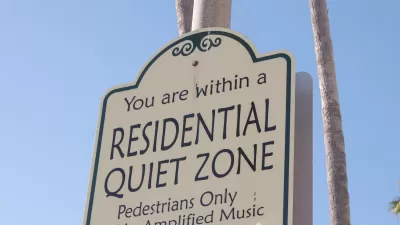If signed by Governor Gavin Newsom, a new bill would use automated sensors and cameras to enforce decibel limits on cars and motorcycles.

“California has long specified the decibel level at which stock or modified exhaust systems are deemed too loud—95 decibels for cars and 80 for motorcycles built after 1985—and this hasn’t changed,” notes an article by Emmet White in Autoweek. Now, a new bill would implement a five-year automated enforcement pilot program to ramp up enforcement.
“A ‘sound-activated enforcement system’ means sensors are activated when noise levels exceed legal limits, and smart cameras are used ‘to obtain a clear photograph of a vehicle license plate,’ the text of Senate Bill 1079 reads.”
According to the bill, “Signage is required to notify motorists before they enter an enforcement zone. First time offenders will not be charged and only subsequent violations will incur fines. Additionally, participating city governments are required to create payment plans, deferment options, and fine waivers for low-income vehicle owners who demonstrate a temporary or indefinite inability to pay.”
White writes that how well the sensors will function remains to be seen. “It will be curious to gauge the accuracy of the enforcement devices, how manufacturers will continue to alter vehicles for California markets, and if the progressive penalty policies become a blueprint for more equitable traffic enforcement.”
Other states and cities are also experimenting with high-tech solutions to noise pollution as more research reveals the harmful effects of noise on public health.
FULL STORY: California Targets Loud Exhaust with Sound-Activated Camera Enforcement

Alabama: Trump Terminates Settlements for Black Communities Harmed By Raw Sewage
Trump deemed the landmark civil rights agreement “illegal DEI and environmental justice policy.”

Planetizen Federal Action Tracker
A weekly monitor of how Trump’s orders and actions are impacting planners and planning in America.

Why Should We Subsidize Public Transportation?
Many public transit agencies face financial stress due to rising costs, declining fare revenue, and declining subsidies. Transit advocates must provide a strong business case for increasing public transit funding.

Understanding Road Diets
An explainer from Momentum highlights the advantages of reducing vehicle lanes in favor of more bike, transit, and pedestrian infrastructure.

New California Law Regulates Warehouse Pollution
A new law tightens building and emissions regulations for large distribution warehouses to mitigate air pollution and traffic in surrounding communities.

Phoenix Announces Opening Date for Light Rail Extension
The South Central extension will connect South Phoenix to downtown and other major hubs starting on June 7.
Urban Design for Planners 1: Software Tools
This six-course series explores essential urban design concepts using open source software and equips planners with the tools they need to participate fully in the urban design process.
Planning for Universal Design
Learn the tools for implementing Universal Design in planning regulations.
Caltrans
Smith Gee Studio
Institute for Housing and Urban Development Studies (IHS)
City of Grandview
Harvard GSD Executive Education
Toledo-Lucas County Plan Commissions
Salt Lake City
NYU Wagner Graduate School of Public Service





























